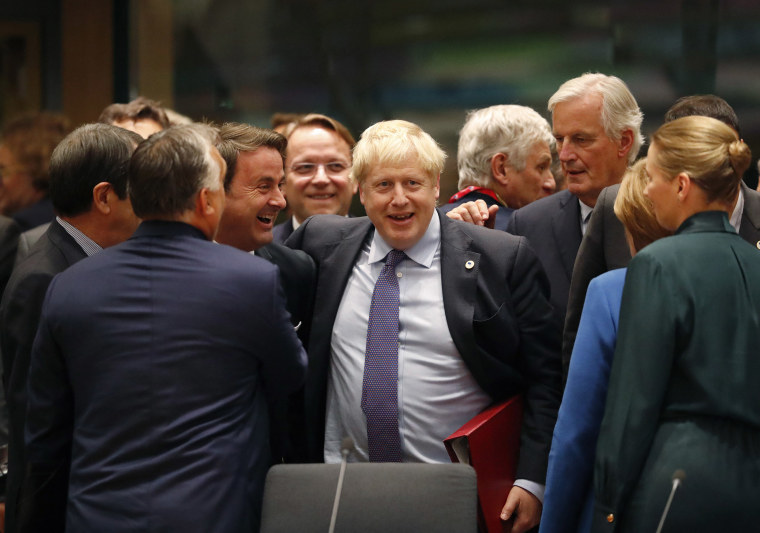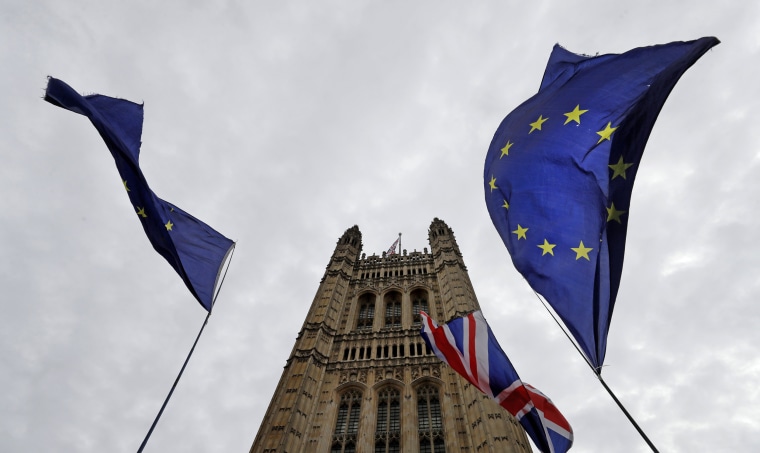LONDON — To hear British Prime Minister Boris Johnson tell it, he has won an enormous victory, securing a deal that will finally take his country out of the European Union.
So is Brexit done? Not by a long shot.
In reality Johnson has made only as much progress as did his predecessor, Theresa May, who also signed a withdrawal agreement with the E.U.
And in negotiating a new plan Thursday, Johnson had to backtrack on key positions, proposing a deal that according to one study will lead to an annual $63 billion hit to public finances.
This was arguably the easy part: Johnson must now get the support of Parliament when it sits for a rare weekend session on Saturday. Lawmakers crushed May's plan three times — inflicting the heaviest government defeat in parliamentary history in the process.
Johnson's attempt to succeed where she failed is on a knife-edge.
So wait, Brexit isn't over yet?
Far from it, sorry.
The prime minister needs to convince more than half the 650 lawmakers of the House of Commons to back his plan. If they don't, by law he will have to write to the E.U. to ask for another extension — which would be the fourth time the U.K has asked for more time since the Brexit referendum in 2016.
So now it all comes down to a crunch Parliament session dubbed "super Saturday," the first time the chamber has sat on a weekend since the Falklands War in 1982.
Johnson has staked his political career on a promise to leave the E.U. by the current deadline of Oct. 31.
Many E.U. officials now just want it done, too. While expressing sadness at the divorce, they have become frustrated at what has become a chaotic, draining process, and while some may have previously hoped that Brexit could have been averted, many now simply want this to end.
As German Foreign Minister Heiko Maas put it on Friday, "The time for political games is over."
The magnitude of Johnson's task became apparent almost immediately after he secured his deal Thursday, when a range of opponents said they would vote against it.
"Getting the deal through Parliament is going to be difficult but not necessarily impossible," said Tim Bale, a politics professor at Queen Mary University of London. "No one should rule out a deal — momentum is on Johnson's side, after all — but the numbers may not be there, and in the end that's what counts."

The Democratic Unionist Party, Johnson's sometime allies from Northern Ireland, were the first to withdraw their support. They alleged his deal did not look out for their interests and was a threat to the unity of the U.K. itself.
The opposition Labour Party soon followed, condemning the deal as worse than May's. But it appears Johnson's only hope is to persuade some Labour rebels to break ranks and support him.
Why all the opposition? What is in the deal?
Johnson's new deal would enforce a "harder" version of Brexit than the one proposed by May.
After a brief transition period, Britain would break away from E.U. regulations on customs and rules such as the free movement of people and goods.
However, whereas May's plan included a safety net if negotiations failed, Johnson's plan has no such provision. The U.K. could still end up with a "no deal" Brexit next year if another deal — a free trade agreement — isn't reached.
Just to make matters even more complicated, Northern Ireland, which is part of the U.K., will remain in a relationship with the E.U. whatever happens, as a way to avoid a hard border with the Irish Republic.
"This deal, if it goes through, would set a permanent relationship between Northern Ireland and the E.U. But for the rest of Great Britain, the future relationship is still up for grabs," said Joseph Owen at the Institute for Government, a think tank.
Whichever party governs the U.K. in the future could decide what that future relationship might be, ranging from a close partnership — a so-called soft Brexit that keeps many E.U. rules — or a no-deal Brexit that some support despite forecasts saying it could trigger economic misery, food shortages and even civil unrest.

Why does Ireland matter so much?
Northern Ireland has been the main sticking point during much of the Brexit negotiations.
The short version is that Brexit risks creating a "hard border" between Northern Ireland, a part of the U.K, and the Irish Republic, a separate country that will remain part of the E.U. after Brexit. The worry is that a border would see the return to the sectarian violence that plagued Ireland for 30 years.
Johnson's deal seeks to cope with this by keeping Northern Ireland tied to some E.U. regulations. This was a major backtrack for Johnson, who last year said that no Conservative leader would ever consider it because it would "leave Northern Ireland behind as an economic semi-colony of the E.U."
The plan is also close to an E.U.'s proposal that was rejected by May's government in 2018.
"So one could say the last couple of years the U.K. spent trying to come up with an alternative [plan] constituted a waste of valuable time," said Bale at Queen Mary University London
So what happens if Johnson's deal fails on Saturday?
While some British pundits are loathe it admit it, no one really knows.
What is clear is that legislation would immediately kick in forcing Johnson to ask Europe for yet another extension — an uncomfortable position given he's repeatedly said he would refuse to do so.
In the coming months, many experts predict there could be an early election. If this returns a decisive victory for Johnson's Conservatives, as polls suggest it might, this could give him much more power to achieve Brexit.
"But you could also end up with another Conservative minority government, or a very narrow majority that isn't enough to be able to get Brexit through," Owen said. "So there is no guarantee that this would provide a solution either."
